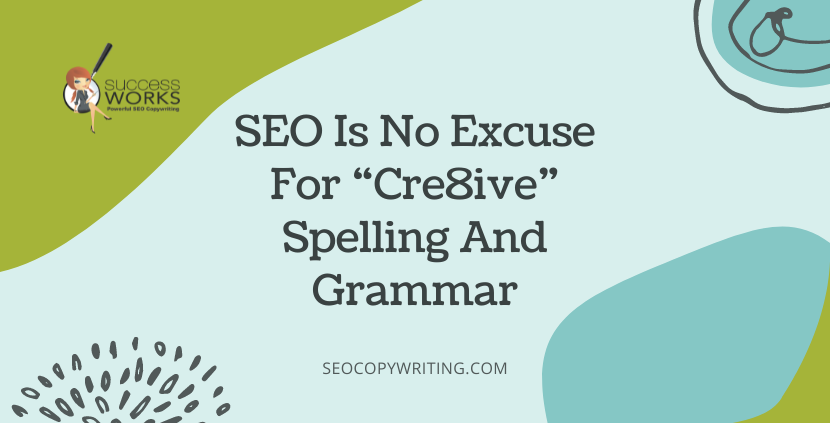SEO Is No Excuse For “Cre8ive” Spelling and Grammar
Despite the claims by some less-than-reputable SEO firms or by those who only see the technical aspects of search engine optimization, it’s not enough to just have “a lot of content” on your website. It’s not so simple.
Your content – whether on your home page, your blog, or a sales page – needs to be well-written. It needs to appeal to your audience and to cause an action (besides hitting the back button). Don’t believe me, then be sure to check out Heather’s video on transforming features into benefits or any of the zillions (pardon my hyperbole) of articles on using engaging and grammatically-correct copy to convert visitors to clients.
The point is: spelling and grammar mistakes can make stellar copy fall flat. It can also make your audience question your professionalism and your attention to detail.
Bad spellers of the world untie!
Yes, I used “untie” intentionally. Why? Because spell check has no problem with that word even though “unite” would have made more sense. We have become too reliant on spell check! That’s right, I said it.
Don’t get me wrong, I love spell check because sometimes I have no clue how to spell a word … and other times I can’t type to save my life. However, hitting the spell-check button, going through the list of corrections, and considering your post edited is not the way to go.
Were your parents zombies? Didn’t think so
Have you ever called someone named “Brian,” “Brain” by mistake? My guess is you haven’t made this error when speaking, but you might have done it while typing. I know I have.
Spell check tells me that “Brain” is spelled correctly. It doesn’t know that my friend’s parents were not zombies who named their son after their favorite meal. By not proofing your work – I mean actually reading it and not just hitting spell check – you would not catch this mistake.
Being loose with spelling and grammar makes me lose my mind
As a writer, I have the bad habit of mentally correcting grammar, especially when I see it typed out – whether on my computer or printed material. As much as I love my friends, their loose use of grammar and spelling can make my Facebook sessions painful.
Please don’t get me wrong. I understand that Facebook (especially for individuals) is a social medium and rules can be relaxed; however, many of the common mistakes I see on my friends’ wall posts I also see on professional websites and in various marketing materials.
There are many repeat offenders and I believe if we can correct the issues surrounding them, we will remove a high percentage of grammar and spelling mistakes out there. My short wish list (with some tips) would include:
- Loose, lose and loss: I’m amazed at how often I see these words confused for one another. As a football fan, I offer this quick reminder: A running back with a loose grip may lose the football and cause a loss for the team.
- There, their and they’re: Homonyms are tricky, I get it, but it’s not that difficult if you try. Remember contractions represent a combination of two words, so when you mean “they are” use “they’re.” When you are referring to a place, think “Where? There.” (Only the first letter is different.) That leaves “their” to show possession.
- Your, you’re and yore: Just like the previous example, when you mean “you are” use “you’re.” In almost every other situation, use “your.” Unless you have a hankering to speak Middle English leave yore alone. (If you’re wondering why “yur” is not on this list, it’s because “yur” is not a word.)
- Its and it’s: Of my pet-peeved word mix-ups, the confusion here makes the most sense to me. You are taught to use an apostrophe when showing ownership. However, in this case, “it’s” is only used when combining “it is.” Every other instance is its. Sorry, it is [author’s note: I could have used “it’s] just one of the screwy rules of the English language.
Save the shorthand for the birds, I mean Twitter
If you must use abbreviations, creative spelling and relaxed grammar rules, at least save it for text messages and Twitter where your character count is limited and shorthand is accepted. Also, remember, if you do have room to write something out, please do.
This should be fun to submit to spell check
Today spell check does not just check for spelling errors. Depending on your settings, it could alert you to certain grammar errors, unclear phrasing, passive sentences, gender-specific words and more. If I just followed the suggestions from spell check for this article, some of my examples would make no sense. Thankfully, I will not only run spell check – reviewing each suggestion individually – but I will also proofread the copy (and have others proof it).
Yes, spell checkers are getting “smarter,” but that doesn’t mean we need to be dumber.
Amy Teeple is an SEO Copywriting Certification graduate and a past editor for the SuccessWorks blog.



Love it! I’ve always said “awesome content first” and then “SEO second.” Probably because the awesome content will drive eyeballs, which will drive sharing, which will, in turn, drive SEO.
Well said!
Thanks Dave!
It truly pains me to see companies spend a lot of money on internet marketing, but fail to put value on something as basic as good grammar and spelling … let alone copy that actually converts!
Lol… I see nothing wrong with a little cre8ivity (e.g., https://www.cre8asiteforums.com/forums/topic/9134-marketing-101-introducing-the-essentials-of-marketing/). ????
Really fun and informative article, Amy. Thanks!